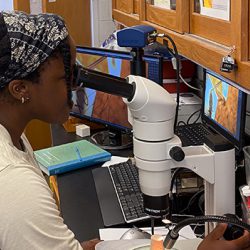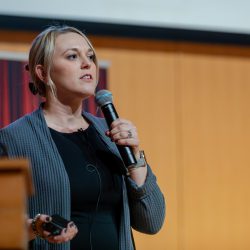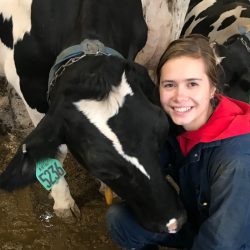With a passionately global focus, the Michigan State University College of Veterinary Medicine celebrated the successful completion of the inaugural public health initiative in Uganda in conjunction with Veterinarians Without Borders (VWB), the American College of Veterinary Pathologists (ACVP), and USAID.
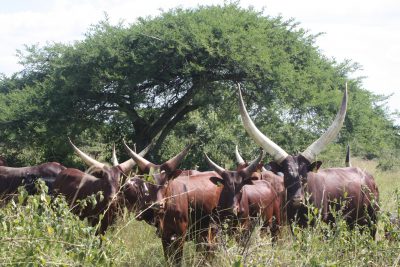
These and other institutions are working together to promote the One Health Initiative, a collaborative multi-disciplinary effort working toward optimal and sustainable global health for humans, animals, plants, and microbes.
Public health programs are crucial to the development goals of several countries within Africa. With the collaborative efforts of the organizations previously mentioned, these programs provide education and resources needed for these countries to establish sustainable changes within their food hygiene and sanitation practices.
Not only do these programs help the countries, but they provide continuing education to MSU’s future DVMs so that they too will be a part of MSU’s mission to elicit continued global outreach and development
The College departments and programs that participated in this trip include Large Animal Clinical Sciences (LCS) including the MS in Food Safety Program, Pathobiology and Diagnostic Investigation (PDI), and International Programs. Students from each area had the ability to be a part of this inaugural trip.
MS in Food Safety: hygiene and sanitation standards at pork vendors
Large Animal Clinical Sciences (LCS): pork butchering
Senior veterinary students Chelsea Van Assche, MPH, and Kendra Andrie, Masters of Food Safety candidate, arrived in Uganda to work on improving food hygiene and sanitation practices at pork vendors, where pork is cooked and offered for public consumption. To begin, Chelsea and Kendra observed pork processing and food handling at multiple vendors to identify hazards. With this information, they wrote a field manual that covered:
● the One Health Initiative
● proper post-mortem exam techniques
● common endemic and zoonotic diseases
● important hygiene and sanitation protocols
● biosecurity practices
Chelsea and Kendra also created a pork vendor remodeling plan to help create a more sanitary environment for food handling. VWB and USAID provided funding to remodel one pork vendor's establishment, which they completed in less than three days. This served as an example to help improve future hygiene and sanitation standards.
Pork is a delicacy in Uganda, where they have the highest consumption rate in all of East Africa. LCS sent Scott Kramer, MS, PhD, MBA, and Amanda Craig, senior veterinary student and Masters of Public Health candidate, in partnership with VWB to focus in on the butchering of pork in Uganda. They immediately observed mishandling and hygiene obstacles that butchers were facing. Even when hygiene standards were observed during the butchering process, the meat would be hung in open-air markets where it was exposed to dust and insects.
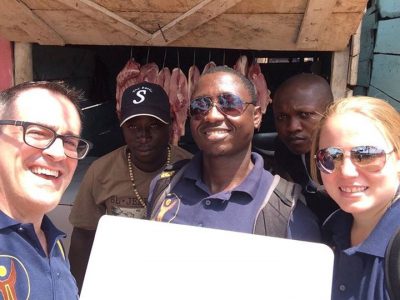
Scott and Amanda’s Go Fund Me: Helping Uganda Pork Producers
Scott and Amanda set out on the challenging mission to help train the butchers on proper pork hygiene, carcass handling, and biosecurity practices. While teaching this course, Scott and Amanda were able to use the manual previously written by Chelsea and Kendra, as well as create another manual for the course. In addition to the training, VWB transformed an old butchery into a low-cost model to serve as a reference point for butchers in the future. This new outlet better conformed to safety and sanitization standards set by district authorities.
Pathobiology and Diagnostic Investigation (PDI): improving recognition and reporting of transboundary diseases in livestock
In joint efforts with ACVP and VWB, PDI sent PhD student Sarah Corner, DVM, MS, DACVP, to teach basic pathology skills to livestock and wildlife veterinarians. Three-day workshops were taught in five districts throughout the “cattle corridor” of Southwest Uganda. A team of Ugandan VWB staff and a VWB senior veterinary student volunteer, Marek Mrzyglocki from Virginia-Maryland, accompanied Sarah at the training sites.
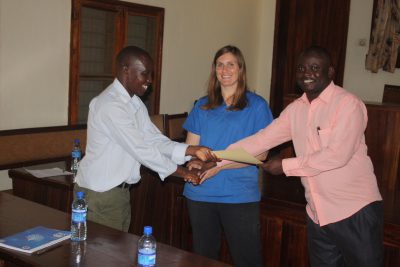
These workshops focused mainly on training Uganda's field veterinarians with the ultimate aim of improved recognition and reporting of transboundary diseases by teaching basic field pathology skills. Diseases such as foot-and-mouth disease and African swine fever are endemic in Uganda, which impacts both wildlife and livestock species. A joint effort between Uganda’s wildlife and livestock veterinarians is critical for reducing the spread of transboundary diseases. The workshops also served as an opportunity for these veterinarians to come together and work toward a common goal.
Sarah worked closely with Thomas Graham, DVM, PhD, CEO of VWB, Corrie Brown, DVM, PhD, DACVP, and Tanja Zabka, DVM, DACVP. Sarah credits them for counseling her on how to teach pathology abroad, helping with curriculum development, and providing a field manual for use during the program. She also worked closely with her mentor, Dalen Agnew, DVM, PhD, DACVP, Associate Professor and Pathologist at the MSU College of Veterinary Medicine.
While Sarah's teaching was successful and well received by the Ugandan veterinarians, the resources required for Uganda to implement and transform these lessons into consistent applications remains a challenge. According to Sarah, more funding to build infrastructure and publicity to raise awareness are vital.

